PHOENIX, AZ — When Georgia Baptist “Send Me Now” summer missionaries descended on this western city for a week of missions outreach, they may not have known they were part of a groundbreaking ministry.
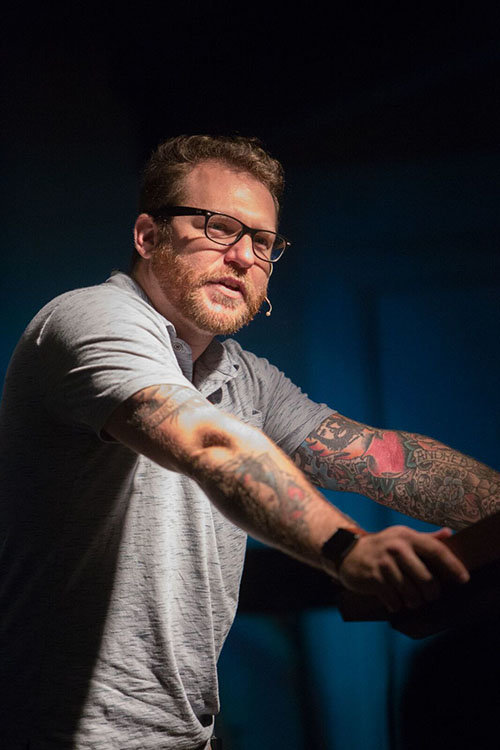 Tony Valenti, pastor of Bridge Phoenix
Tony Valenti, pastor of Bridge PhoenixBut by the time they returned to Georgia, they had made a difference for eternity in a growing network of inner city churches.
Tony Valenti, lead pastor at Bridge Phoenix, is grateful the collegians came to town as part of Crossover leading up to the Southern Baptist Convention’s annual meeting. He just wishes he had more volunteers like them to extend the ministry of his and other staff members.
For one hot week – with temperatures topping out at 107 degrees – the summer missionaries worked at Bridge Mesa, one of the churches in the growing Bridge network of congregations in economically challenged parts of Greater Phoenix. They pulled up carpet that was older than themselves and generally helped bring the old building up to date.
Valenti and his team are pioneering an innovative way of redeeming the city on a virtually nonexistent budget. It consists of identifying dying or closed churches and relaunching them as compassion ministries that grow into healthy congregations.
He is part of a younger generation taking root in the denomination that believes hurting people are hindered in listening to a gospel presentation if they are struggling to survive. It is by investing in their lives – helping them to find job skills, employment, adequate food and housing – that believers earn the right to be trusted with sharing spiritual matters.
The West Coast native has been a Southern Baptist since he was 17 but never lived in the South. He sees that as an asset because he does not have the Southern mindset toward church planting that would be a barrier in the West. That frees up him and others to be far more creative, he believes.
Valenti moved from California to Arizona in his mid-teens and felt a calling to the ministry but had not decided just what form that would take. He was interning at a church in Lake Havasau when he met the founding pastor of Bridge Mesa. That minister, Aaron Norwood, encouraged him to transfer to Arizona State University in Phoenix and join the staff as youth pastor. Valenti, 19 at the time, was up for the challenge.
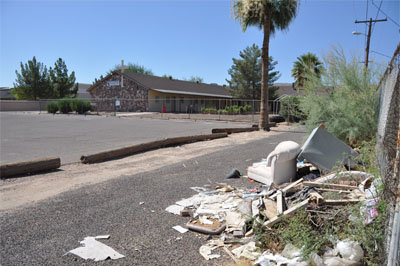 Bridge Phoenix, located on the southside of town in a former church, seeks out properties in the most economically challenged neighborhoods in which to take the gospel. JOE WESTBURY/Index
Bridge Phoenix, located on the southside of town in a former church, seeks out properties in the most economically challenged neighborhoods in which to take the gospel. JOE WESTBURY/Index“The Bridge was the young, hip, cutting-edge church at the time meeting in night clubs and bars because we couldn’t afford anything else. Many of the youth were from gangs and lived in extreme poverty. It was kind of scary and I had no idea what I was doing but that is where I received my strong calling to inner city ministry,” he recounts.
Eventually Norwood retired and shifted his focus to overseeing the on-site food bank. Valenti stepped into the pastoral role, learning as he went, and today serves as a church planter through the North American Mission Board. That included refining the vision of locating a permanent meeting place from which to grow the congregation by meeting the needs of the community.
That living-on-a-non-existent-budget was deep in the DNA of the Bridge concept. And when you don’t have money, you look for the cheapest building possible. Like, for free.
That is how the congregation located its current building south of downtown in a former Southern Baptist church. It is using that formula to launch other churches across the Valley, beginning with its first plant in Mesa where the Georgians were serving.
“Southern Baptists and others had a strong church planting emphasis in the West in the 1960s and ‘70s with many of those planters coming from Oklahoma and the South. The churches did well for a time but the culture changed and the churches plateaued and began to die. Many closed their doors and remain empty today,” he noted.
“We want to find the oldest, messiest, most neglected buildings in the worst communities and place a church there. Buildings that are in terrible condition really excite us,” he says with a laugh.
Bridge Phoenix currently is eyeing one of several such churches that might become available.
“We don’t want to ‘take over’ old churches that are still existing. If the church has closed we will launch a new ministry from that location. If it is struggling, we want to work with the congregation to help them have a vibrant community of faith. Church revitalization is part of what we do,” he explains.
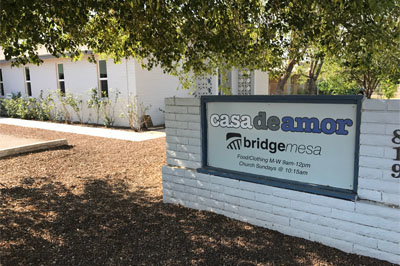 Cada de Amor is the compassion ministry arm of Bridge Mesa, which meets in a former Arizona Baptist congregation. The property was given to Bridge Phoenix for a church relaunch. JOE WESTBURY/Index
Cada de Amor is the compassion ministry arm of Bridge Mesa, which meets in a former Arizona Baptist congregation. The property was given to Bridge Phoenix for a church relaunch. JOE WESTBURY/Index“Our heart is to plant churches in the inner city by taking over failing or failed churches.’
That vision currently takes form in three congregations in two locations.
Bridge Mesa is the location where the Georgia Baptist summer missionaries served. Lesher, a NAMB church planter, notes that 96 percent of elementary students in the neighborhood school, are living in poverty. The neighborhood consists largely of working poor, multi-generational families. The small church, known as MacDonald Road Baptist Church, was a strong Southern Baptist congregation in the 1960s but had declined as the neighborhood underwent transition. Lesher serves the congregation along with his wife, April.
Rio Vista Center, based out of the Bridge Phoenix location, is the mother community resource center for the church plants. It offers emergency food boxes, a farmer’s market, clothing, job center, SNAP services (formerly known as food stamps for qualified individuals), New Life Pregnancy Center, and a community garden.
The Center is a partnership with the Arizona Baptist Children’s Services and Family Ministries. Its’s website says it is “7 ministries with 1 mission: to provide hope and care to hurting children and families through Christ-centered ministries.”
The philosophy for all the ministries is quite simple; be the incarnation of Christ in hurting places, meet needs first as Christ provided the example, and then share the Good News.
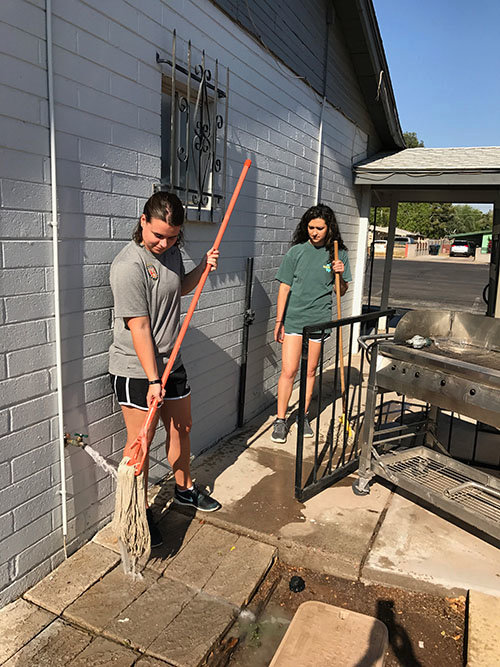 Kelsey Julian, left, and Amelia Daniel prepare to wring out mops while cleaning Sunday School classrooms at Bridge Mesa. Julian, a Georgia Tech student from Lawrenceville, and Daniel, a Gordon State College student from Manchester, were part of a Send Me Now mission team through Georgia Baptist Collegiate Ministries. JOE WESTBURY/Index
Kelsey Julian, left, and Amelia Daniel prepare to wring out mops while cleaning Sunday School classrooms at Bridge Mesa. Julian, a Georgia Tech student from Lawrenceville, and Daniel, a Gordon State College student from Manchester, were part of a Send Me Now mission team through Georgia Baptist Collegiate Ministries. JOE WESTBURY/Index“Our goal is to reach the inner city and live out that calling to the best of our ability,” Valenti explains.
He notes that problems that plague other churches are virtually nonexistent because their need to survive are greater than the luxury of church politics.
“When people in your church have real needs, they don’t have time for petty politics which can sideline a church’s existence. Because we are dealing daily with hunger, poverty, and neighborhood crime – the real focus in life – we are forced to avoid other less important issues,” he adds.
He states that the most important mantra they teach is that theirs is not a mission to poverty or poor people but to the community.
“We are not there to ‘save’ people – Christ does the ‘saving’ – we are just there to be a church in a high-poverty part of town.”
The Bridge leadership is focused on building up new leaders from the ranks they serve and using them to strengthen existing congregations and launch new ones, as well.
“We are dedicated to training, mentoring, and giving people all the experience they need to be a part of this exciting movement. We do not want to send anyone out until they are fully prepared for the hardships they will encounter,” he notes.
Lesher, taking an afternoon break with the Georgians, shares the concept. He reflects on the progress of the church relaunch, noting that when he and April arrived in August 2015 they were averaging serving 25 families a month.
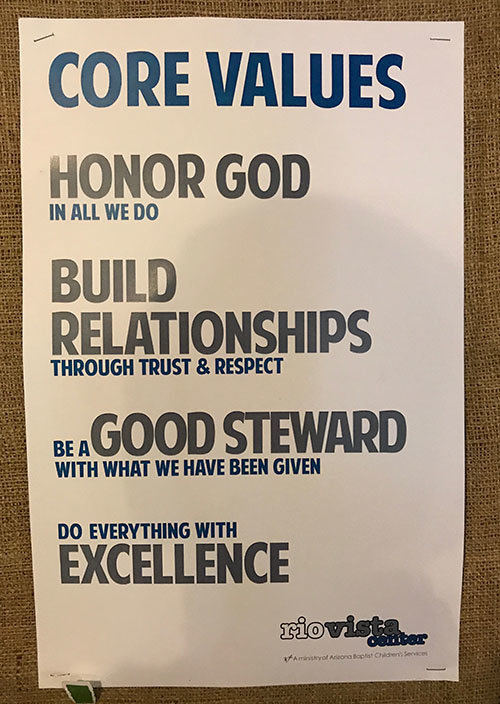 Both Bridge Phoenix and Bridge Mesa have gospel-centered ministries which are used to first meet social and economic needs and then spiritual needs. JOE WESTBURY/Index
Both Bridge Phoenix and Bridge Mesa have gospel-centered ministries which are used to first meet social and economic needs and then spiritual needs. JOE WESTBURY/IndexShortly before the Georgians arrived in June they served 350 … all who had a chance to hear the gospel.
Building a network of large churches is not part of the plan, he stresses. If it happens God will get the glory, but the focus is more on meeting immediate needs and launching other community ministries that can grow into healthy congregations. Results, not congregational size, is what's important.
“We know that we are not going to solve the issues of poverty through community resource programs – only a relationship with Christ can do that,” he explains.
"Our Bridge name is not just a reference to the relationship between God and man but between all the societal and political areas which fragment society and the lives of families and individuals. We go into some of the city's roughest neighborhoods to redeem them and turn them around for the Kingdom, address all issues.
"It's not easy but God never told us it would be. Planting churches in the inner city is always difficult. If you can look past the struggles and see the victories ... people's lives changed both here and in eternity ... it is worth all the blood, sweat, and tears you have shed on the battlefield," Lesher says.
"It's definitely not for the weak-hearted."